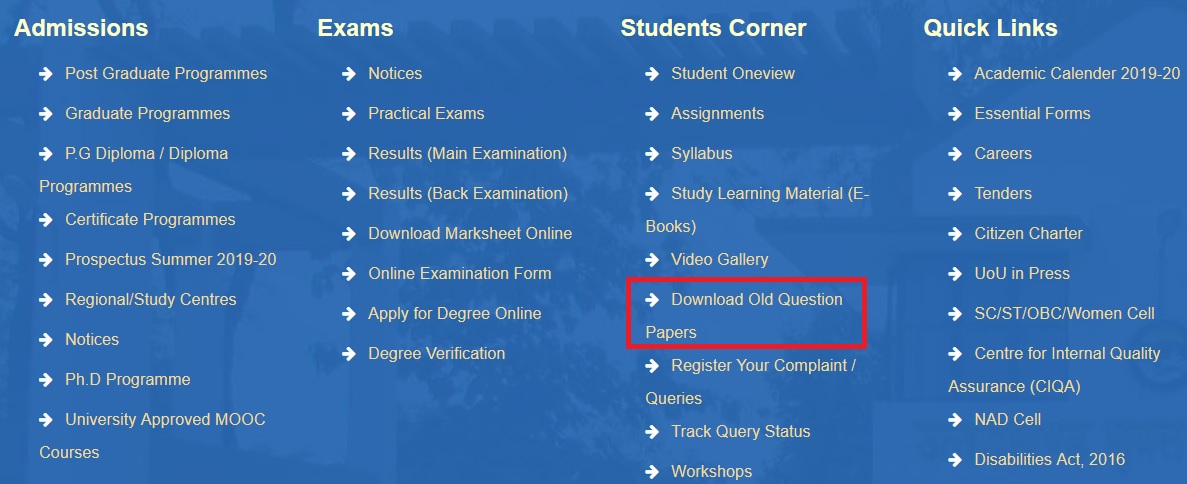CP1006 Management And Organisational Behaviour M.B.A Old Question Papers : uou.ac.in
Name of the University : Uttarakhand Open University
Degree : M.B.A
Subject Code/Name : CP1006 Management And Organisational Behaviour
Document Type : Old Question Papers
Website : http://www.uou.ac.in/old-question-papers
UOU Management & Organisational Behaviour
MBA-10/MBAH-11 (Master of Business Administration/Diploma in Management)
Time : 3 Hours
Max Marks: 60
Related : Uttarakhand Open University CP1007 Research and Communication Methodology M.B.A Question Bank : www.pdfquestion.in/4343.html

First Semester
Note : The Question paper is divided into three sections A, B, and C.
Section –A : (Long Answer Question)
Note : Answer any two questions Each Question Carries 15 Marks
1. What is decision-making? Discuss various methods which facilitate decision- making.
2. What is the nature and purpose of formal & informal organisation Explain the different types of organisation structure.
3. What do you understand by motivation? Explain any two theories of motivation.
4. Define social responsibility of business? Give two arguments in favor and two arguments against social responsibility of business.
Section – B : (Short Answer Question)
5. Answer any 4 question. Each question carries 5 marks
5.1 Weather management is an art or a science? Discuss.
5.2 What are the basic managerial functions?
5.3 What is environmental analysis?
5.4 What is forecasting? Discuss two quantitative and two qualitative methods of forecasting.
5.5 What is planning? Write the steps involved in planning.
5.6 Differentiate between authority and power.
5.7 Explian the steps involved in control process.
5.8 What are barriers to effective communication?
Section – C : Objective Question (Compulsory)
6. Note: Answer all questions. 10 X 1 = 10
(Write True / False against the following –
6.1 Objectives are specific and short terms oriented. (True / False)
6.2 Planning can offset uncertainties completely. (True / False)
6.3 Conceptual skills are more important for middle managers than top managers (True / False)
6.4 Management concepts and practices vary with countries and cultures. (True / False)
6.5 Membership is voluntary in informal groups. (True / False)
7. Choose the correct alternative :
7.1 Who is known as the father of administrative management?
(a) Peter Ducker
(b) Henry Fayol
(c) Elton Mayo
(d) Max Weber
7.2 By what name the major contribution to management by F.W. Taylor Known.
(a) Mary Parker Follett
(b) Douglas McGregor
(c) F.W. Taylor
(d) Von Bertalanffy
7.3 Which of the following generic function is not a management function?
(a) Leading
(b) Organizing
(c) Uninforming
(d) Planning
7.4 Which of the following is not a characteristic of effective control system?
(a) Accuracy
(b) Timeliness
(c) Flexibility
(d) Single criteria for measuring performance
7.5 Which of the following is not generally regarded as a characteristic of charismatic leadership?
(a) Attention to details
(b) Vision and ability to articulate the vision
(c) Behaviour that is out of the ordinary
(d) Environment sensitivity

Second Semester
Examination-2015 :
CP-1006 Management & Organizational Behaviour :
Time : 3 Hours
Maximum Marks : 60
Note : This paper is of sixty (60) marks divided into three (03) sections A, B, and C. Attempt the questions contained in these sections according to the detailed instructions given therein.
Section – A : (Long Answer Type Questions)
Note : Section ‘A’ contains four (04) long-answer-type questions of fifteen (15) marks each. Learners are required to answer any two (02) questions only. (2×15=30)
1. “Management is an essential component of all social organizations and it is to be found everywhere as a distinct, separate and dominant activity”. In wake of this statement, explain the importance and various functions of management.
2. Explain the two factor theory of Herzberg and also compare
3. Describe in detail the different models used for the study of organization behavior.
4. A large organisation consults you for introducing Management by Objectives (MBO). How will you explain the benefits and the problems of Management by Objectives (MBO)? What steps will you advise the organisation to take for successful introduction and operation of Management by Objectives (MBO)?
Section – B :
1. Essence of Management and Administration.
2. Characteristics of Scientific Management Approach.
3. Techniques of Environmental Analysis.
4. Essential Elements of effective control system.
5. Relationship between Authority and Responsibility.
6. ‘Laissez Faire Leadership Style’
7. Factors contributing to Group Cohesiveness.
8. Barriers to Effective Communication
Download Model/Sample Question Paper :
https://www.pdfquestion.in/uploads/uou.ac.in/4346.-CP-1006%281%29.pdf
Are there no solutions to these questions?